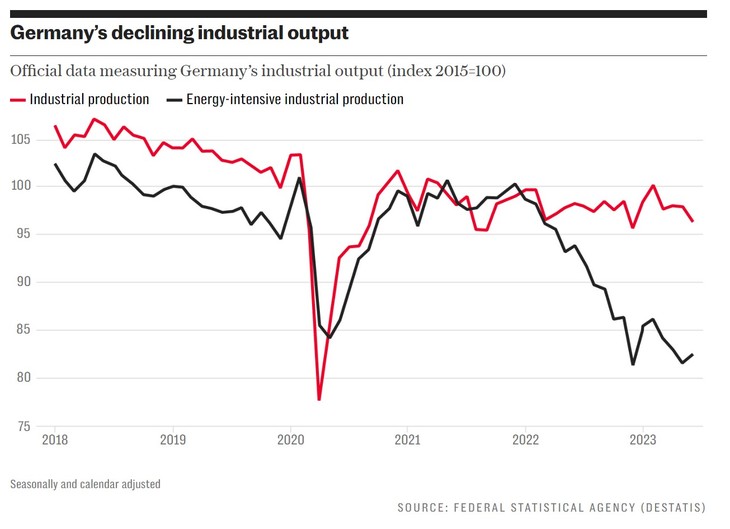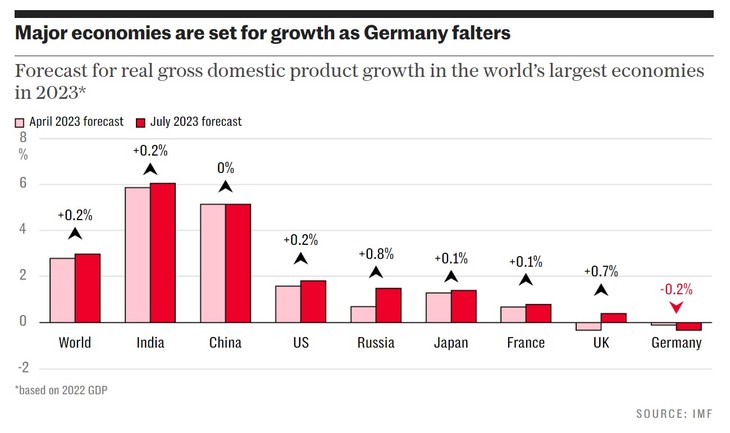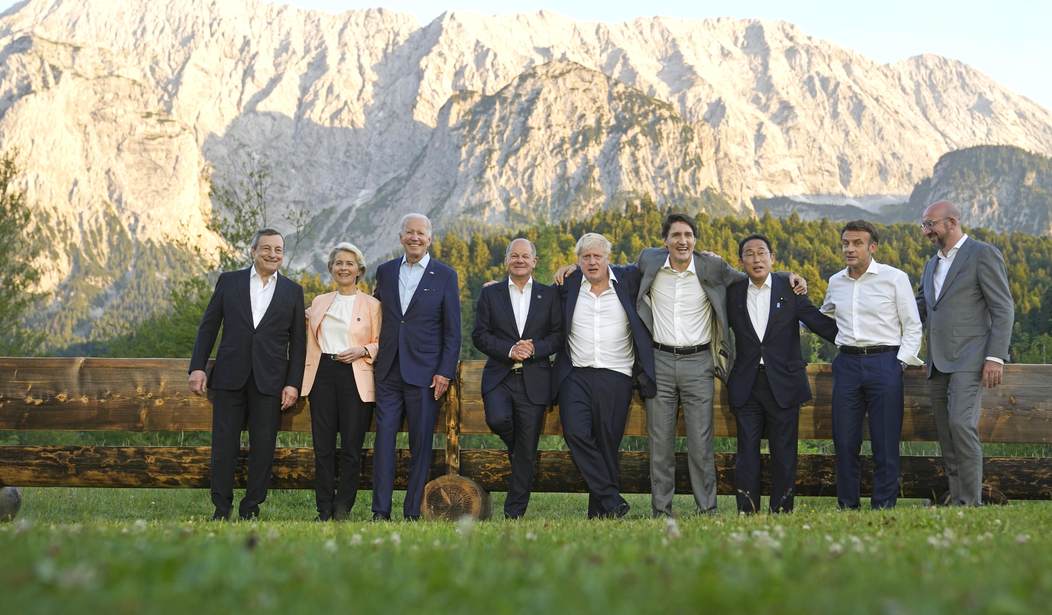Germany.
After former Chancellor Angela Merkel, the fellow who bears a great deal of responsibility for running Europe’s muscleman into the proverbial dirt – current chancellor Olaf Scholtz – is now moaning about “timidity” in the face of the consequences of his policies.
Olaf Scholtz took to the pulpit of Germany’s parliament this week to paint a picture of a country stuck in “gridlock” that is falling behind its peers.
Himself the worse for wear after a running accident, the 64-year-old chancellor said his country was afflicted by a “blight” of timidity and risk aversion that only an “act of national strength” can heal.
“While we discuss extending a single metro line or building a skyscraper, other countries have long since finished entire projects,” he said. “The people of our country are sick of the gridlock and so am I.”
It was a far cry from the braggadocio of only six months ago when Mr Scholz predicted investments in green energies would soon kick off boom years to rival those seen in the Wirtschaftswunder of the 1950s and 1960s.
Yeah. Those green investments. Somehow the promises on top of promises, and “You just wait!” never, ever seem to pan out, but the all-around misery index sure does.
I’ve been keeping up with their badly faltering industrial complex over the past 9 months or so, due almost exclusively to Scholtz and his Green coalition’s insistence on renewables as primary energy sources, with RUSSIAN natural gas as back-up.
That hasn’t worked out nearly as planned.
…Particularly affected is car production, which has been badly hit by the slowdown in China, and is struggling with the transition to EVs, where the value lies as much in the software as the core manufacturing.
But there are also other energy intensive industries, from chemicals to ceramics, paper and glass.
BASF’s Ludwigshafen Verbund site, the largest such chemicals plant in the world, is reckoned to consume as much natural gas in a year as the whole of Switzerland, yet today must contend with both much higher prices and a determination to phase out gas entirely over coming decades.
When Olaf Scholz became Chancellor as part of a three-party coalition at the end of 2021, he committed his government to the goal of climate neutrality by 2045, accompanied by the promise of a new “Wirtschaftswunder” – economic miracle – similar to the one West Germany experienced after the Second World War.
Climate change goals would help Germany “achieve growth rates last seen in the 1950s and 1960s”, Scholz said as recently as March.
Goodbye to the car industry, with its dependence on increasingly hostile export markets; hello to huge levels of domestic demand for renewables and their accoutrements. That was his message.

Terrific chart.
Regular Germans, who seem pretty complacent about most things, have had enough and are finally vocalizing and acting on their unhappiness.
…It’s not just German households tearing their hair out at Scholz’s particularly aggressive approach to net zero; a once thriving mittelstand also faces crippling levels of investment to meet new environmental standards, with few obvious sources of capital to pay for it.
Most Germans accept the need for the planned transition, but few are under any illusions about its costs, both to wealth and livelihoods.
“It’s like being forced to pull down your perfectly serviceable house to build an entirely new one you don’t obviously need; it’s bound to leave you poorer”, says Ifo’s Fuest.

Germany is poorer for all of these machinations saving the planet. Scholtz’s plans have faced tremendous pushback, while suffering embarrassing revisions lately. The ruling coalition is facing a real test in upcoming elections, having already been handily shellacked in the state ones.
…Germany will indefinitely halt plans on more stringent building insulation standards, environment minister Robert Habeck said on Sept. 24, after industry complaints the measures are too costly and hurt the depressed construction sector.
Germany’s lower house of parliament passed a bill in September on phasing out oil and gas heating systems, though the legislation was criticized by conservatives as too costly and by environmentalists as not strong enough.
Arguing over the law had brought the ruling coalition close to collapse until it agreed to water down the original bill.
The row has helped propel the far-right Alternative for Germany to second place in the polls. The party disputes that human activity is a cause of climate change.
Anger at moves to reduce the number of cars also hit support for the Greens in state elections this year, say pollsters.
There are always concerns raised about the “hard-right” bogeyman when arguing against the Christian Democrats and Socialist parties in Germany. However, the former East German states’ versions of “hard-right” do retain some Soviet influence. They are already making inroads thanks to the Green intransigence on transition and incompetence in managing it so people can actually survive it. You can imagine what that party’s platform is regarding support for Ukraine, as well.
…A recent poll from Saxony, one of three states in the former communist east that is going to the polls next year, found that all three parties in Mr Scholz’s coalition may struggle to win even the five per cent necessary to make it into the state legislature.
Meanwhile, the AfD [Alternative for Germany] is set to win the most seats with 35 per cent of the vote while the CDU would come in second with 29 per cent.
A landslide win for the hard-Right would not just mark a new, worrying chapter in Germany’s post-war history, it would only add to the sense of gridlock in German politics, analysts say.
All the other parties have refused to contemplate working with the hard-Right group, a position the CDU has doubled down upon lately as German domestic intelligence investigates possible links between some of its leaders and the extreme Right.
There’s one more problem the Germans have that’s a stickier wicket down the road – their population. They’ll soon be staring at 64 pensioners for every 100 workers – a pretty unaffordable ratio. How is Scholtz attempting to fix that? Lightening the financial load on the back of Germans and encouraging households to have families?
Nah.
God forbid you have GERMAN families.
Migrants. But only select ones.
…Mr Scholz’s government has brought in a simplified process of obtaining nationality in the hope that this will attract skilled workers.
And very select ones, indeed. In fact, contrary to the open border, “We must welcome everyone, everywhere” policies Merkel forced on Europe, Germany is closing its borders at this very moment.
Germany said Wednesday it would step up policing of its borders with Poland and the Czech Republic, as Berlin seeks to get a grip on rising levels of illegal migration.
Federal police would “carry out additional flexible, targeted controls on the (people) smuggling routes” along the borders with its two eastern neighbours, Interior Minister Nancy Faeser said at a press conference.
The pressure has been growing on Faeser to tighten controls, as the number of illegal entries into Germany has risen over recent months.
Between January and August this year, federal police have detected 70,753 people who had entered Germany illegally, a nearly 60-percent increase on the same period last year.
The surge has reignited the debate in Germany over how best to control immigration, bringing back memories of the 2015 migrant crisis, when tens of thousands of people streamed into the country.
It seems illegal immigration’s also been polling badly for Scholtz.
…Apparently the hippy-esque concept of borderless, policeless states is being abused by bad guys. Well blow me down! You mean people traffickers are having a field day at the numpty-headed idea that nation states abandon the notion of protecting their peoples?
Turns out that is exactly what is happening.
And the good people of Germany, as opposed to the woolly-headed politicians of Germany with their herd-like, dim-wit instincts, are not happy.
Sound familiar?
Oh and there’s an election coming up.
On October 8 voters go to the polls in the German heartlands of Bavaria and Hesse.
And guess what is at the top of voters’ concerns?
Yep, you guessed it… unchecked migration.
The sick man of Europe needs medicine fast.
But do they have the stomach to take it?









Join the conversation as a VIP Member